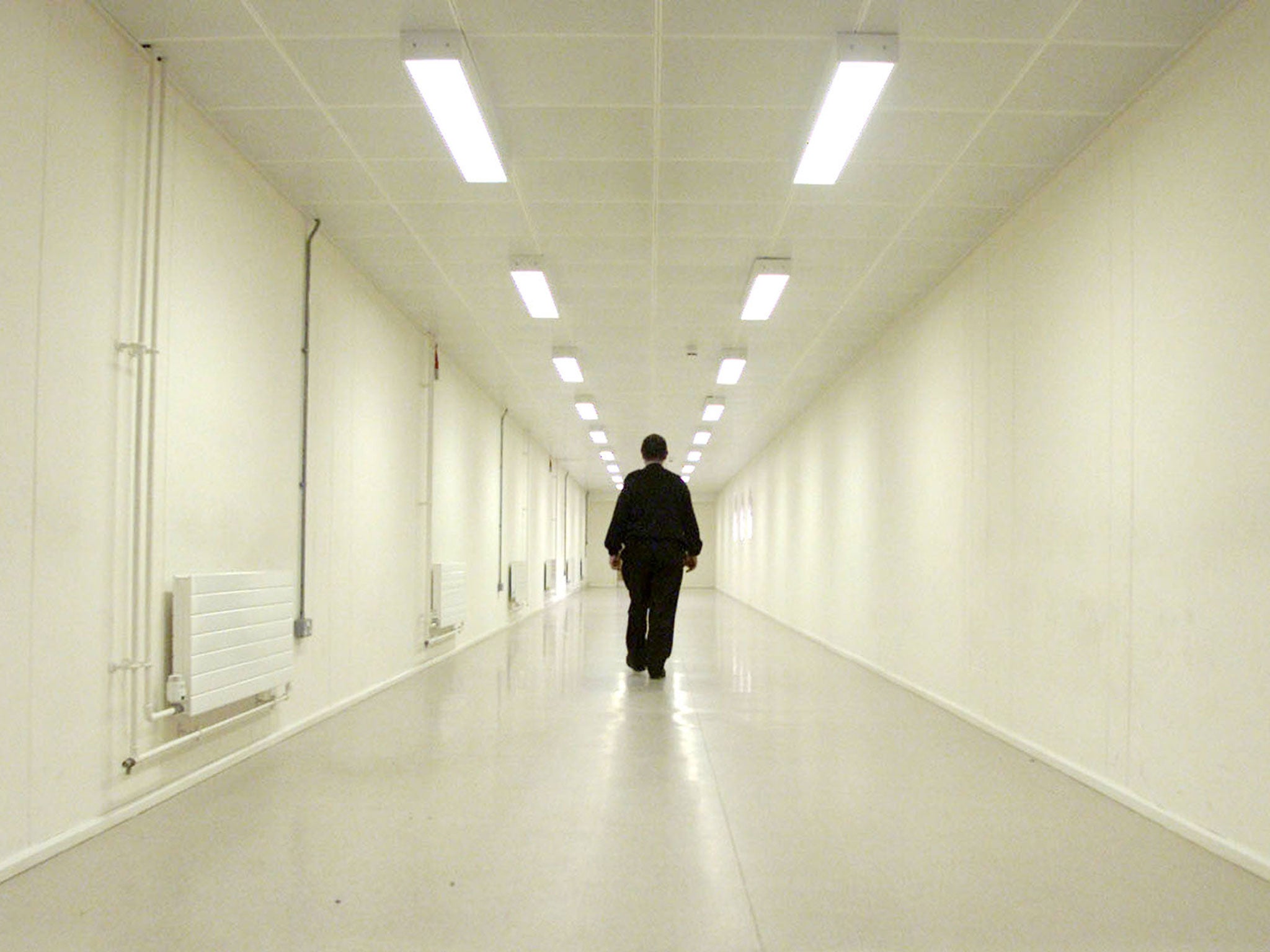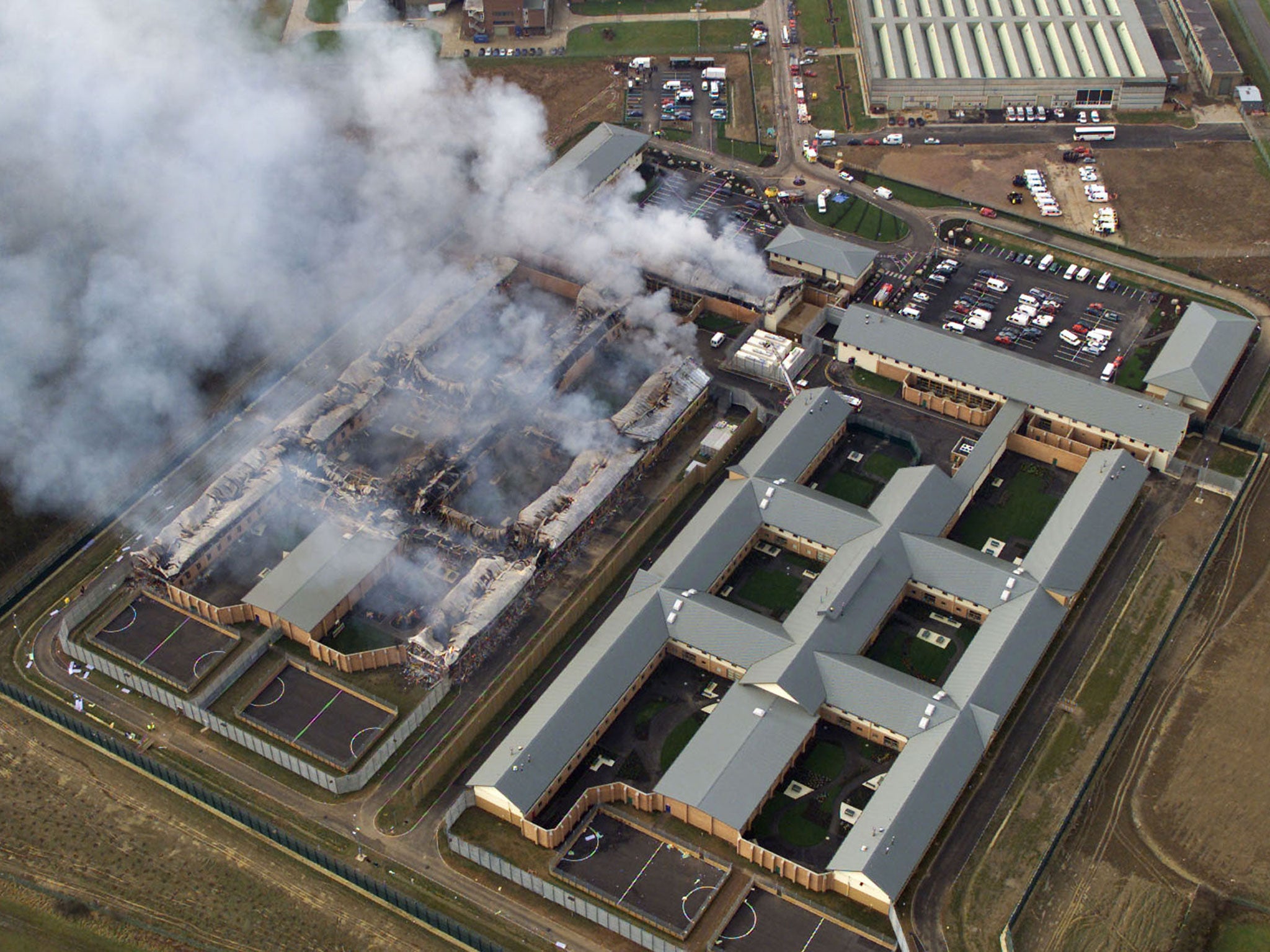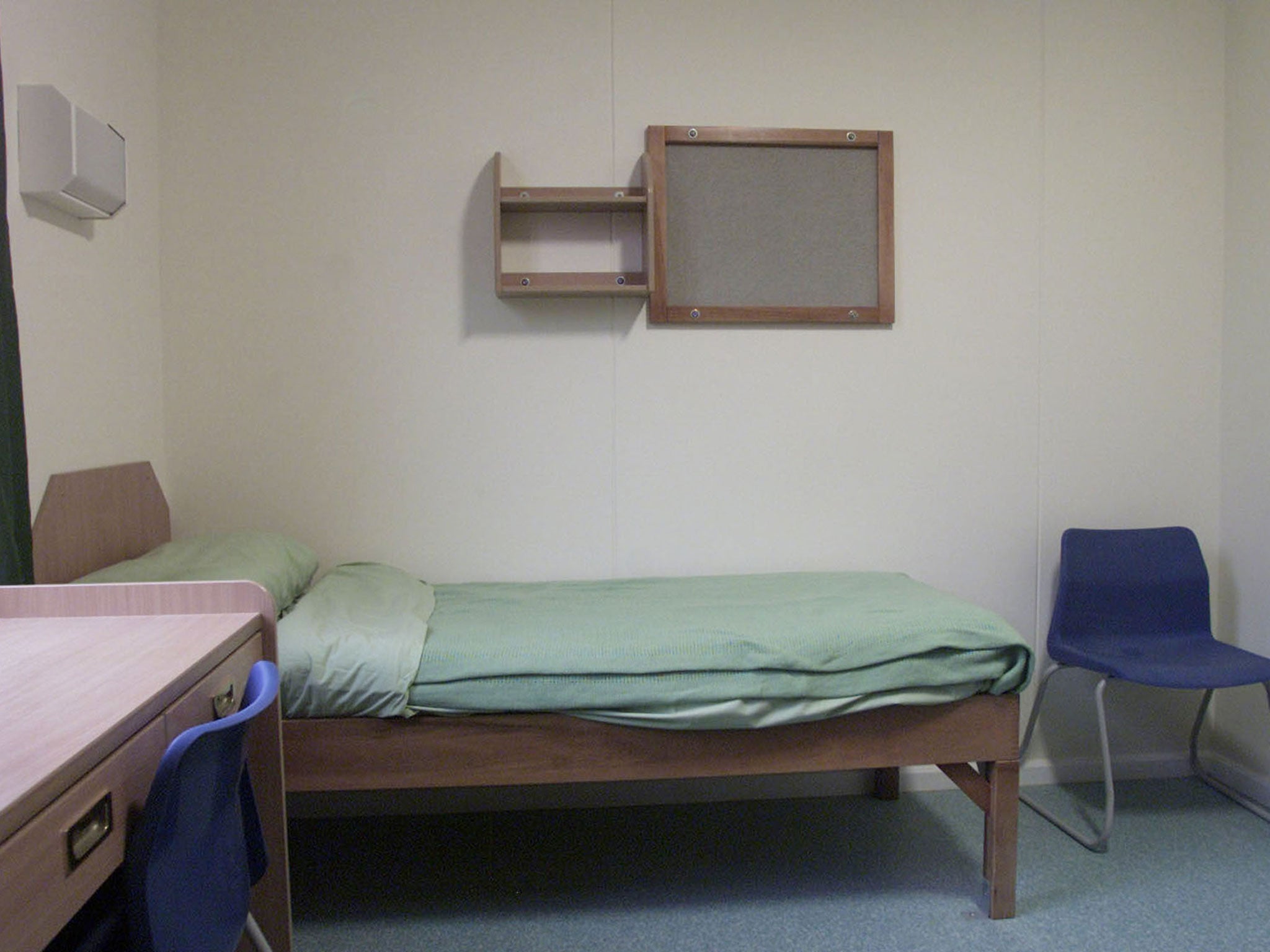Yarl's Wood: Undercover tour of detention centre with dreadful reputation for its treatment of asylum seekers
The Detention Centre in Bedfordshire – privately run, but publicly funded – has a dreadful reputation for its treatment of asylum seekers. Cole Moreton found a way inside to see if its notoriety is deserved

Susan wrings her hands and twitches as she speaks, jerking her head from side to side. She is clearly not well. “I ate washing powder to try and kill myself,” says the nervous woman in her fifties.
Her eyes flash wild. “It was all I could find. I wanted to die. I would rather die than go back.”
Susan says she was a campaigner for human rights in her country of birth in South-east Asia, but that she fled after her mother was murdered by those she opposed.
It was that trauma that forced her to flee to England – it was not Britain’s superb welfare system or the lax immigration controls that prompted the mayor of the French town of Calais, Natacha Bouchart, to describe the UK as an “El Dorado” for immigrants recently.
Susan is now an inmate of Yarl’s Wood Immigration Removal Centre, tucked away on the edge of an industrial estate in the Bedfordshire countryside.
Yarl’s Wood is run by Serco, a private company paid by the taxpayer with no direct accountability to the public. It works for the Home Office, which refuses to answer any specific questions about Yarl’s Wood unless they are put as individual Freedom of Information requests, which may be denied on the basis of infringing commercial interests.
Zadie Smith, the novelist and campaigner, calls Yarl’s Wood “an offence to liberty, a shame to any civilised nation, and a personal tragedy for the women caught in its illogical grip”.
From the front, the sandy-coloured building looks like a large motel. Signs by the entrance offer a welcome in many different languages.
Hidden just around the corner of the facade are the high metal fences, razor wire and surveillance cameras of a prison. While Susan has never been charged with a crime in Britain, let alone convicted of one, she is locked up like a convict. Actually, her situation is much worse.
If Susan were a murderer, she would know when her sentence was likely to end. Instead, she is detained indefinitely under British immigration rules.
“What have I done to be treated like this?” she asks. “I am not a criminal. I came to this country because I needed help, but now things are very bad for me here.”

Getting inside Yarl’s Wood is not easy. First you must explain the reason for the visit, then present a passport, have a photograph taken and biometric details read by a fingerprint scanner. Then wait in line to enter an airlock, one at a time, step through a metal detector and go through a body search.
This intimidating process leads to a strange room like a hospital waiting area with leatherette chairs and coffee machines. Guards pace about, listening in on conversations. Propped up against a wall is an incongruous plastic child-safety barrier, made up of happy nurses and police officers linking hands.
Young people are no longer held at Yarl’s Wood, since a damning report by the Children’s Commissioner for England and Wales found that a sick eight-month-old baby had been denied an asthma inhaler and a diabetic child had been allowed to suffer three serious emergencies in three weeks, including one that left her “unrousable”.
Just outside the window is a courtyard with a mural showing cows and sheep grinning, as a farmer drives his tractor over the hill to a distant purple horizon. But these are illusions. The wall is high. The cameras stare down. The way to the outside world is blocked, several times over.
Almost all the residents of Yarl’s Wood are women, save for a handful of men in the family rooms and a small, separate transit unit. The centre can now accommodate 405 people. The capacity was double that when Yarl’s Wood opened in 2001, as the largest detention centre in Europe, but a fire that started during a disturbance a year later destroyed half the complex.
This was meant to be a place for short stays, where asylum seekers were held briefly before being removed from the country. But the British immigration system is in chaos and a backlog means cases can drag on; it is not unusual to spend a year in Yarl’s Wood. One woman was detained for four years without charge or trial.
Serco will not say how long people stay there on average. That is a matter for the Home Office, it says. Only a third of the women will be removed from Britain, according to Government statistics. The rest will be released, eventually. Journalists are not welcome, but we managed to gain entry as a social visitor, like the volunteer workers who come to befriend and help the women.
They say that Susan has gone downhill dramatically since she arrived six months ago. Visibly exhausted, her eyes heavy with shadows, she is in a tracksuit and flip-flops, her hair swept back haphazardly. Before she came to Britain, politics brought her family into conflict with a heavy-handed government, she says.
“People disappear. They may not kill me straight away if I go back, but after a day, two days, the van will come.”
At night, she says, those who cannot sleep gather in the chapel at the centre, where they talk, pray and wail: “There is crying and screaming. There is kindness here, but we are all afraid.”
Not all the stories in Yarl’s Wood can be completely true, because people who are desperate to be set free will say anything to help their cause, but Susan is not pleading for her freedom. She has given up the fight. “They have given me medication,” she says. “It is very strong. I cannot sleep. I have nightmares. Even now, my mother is haunting me.”
Susan appears to be mentally ill. People with mental illness should not be detained in places like Yarl’s Wood, as was made clear by Her Majesty’s Chief Inspector of Prisons, Nick Hardwick, in his last report a year ago.
Not only that, but the Independent Monitoring Board has also identified a “worrying new phenomenon at Yarl’s Wood: the detention of women with serious mental health issues straight from the airport”.
It is hard to say which of Britain’s 13 immigration removal centres is the “worst”, but Yarl’s Wood has become the most notorious over the years. The fire of 2002 was followed by hunger strikes and claims that the guards were racist, violent and abusive. Serco made efforts to soften the look and feel of the place for residents after taking over in 2007; to make it less confrontational and oppressive, and the company says that it has worked hard to improve relations between residents and the guards.

The Chief Inspector turned up unannounced last year, just after two male members of staff had been sacked for having sexual contact with a female inmate. He said that conditions inside Yarl’s Wood had improved and “good progress” was being made, but there was still much to be done – like recruiting a large number of female guards to calm the fears of residents. Yarl’s Wood was “a sad place” said the Chief Inspector.
“Many may have experienced victimisation before they were detained, for example by traffickers or in abusive relationships,” he said.
A third of detainees have mental health problems, according to the charity Women for Refugee Women, and among these are psychosis, post-traumatic stress disorder, depression, insomnia and flashbacks. They bear the scars of the suffering that brought them to Britain: 41 per cent of past or present detainees surveyed by the charity said that they had been tortured in the past, while 72 per cent said they had been raped. A third had been put on suicide watch in detention.
Noel Finn was the mental health lead nurse at Yarl’s Wood until last year and says that there are several women on suicide watch at any one time. More may be at risk than that, he says, because guards lack the proper training to spot the danger signs or are reluctant to raise the alarm by filling in the right forms for fear of “clogging up the system”.
Finn is one of several past and present members of staff, residents and support workers who told me that inmates are suffering unnecessarily or that lives may be in danger because of the insistence on keeping levels of staffing and training as low as possible.
Keeping an asylum seeker locked up costs the taxpayer £130 a day. Sophie Radice, of Women For Refugee Women, believes they should be allowed to live in the community while their cases drag on – but in the meantime, she says, they are paying the price of the Government’s desire to offload the problem.
“If you pay a private company, it separates the state from responsibility,” she says. “Also, there is this sinister glossing-over that private companies do so well: ‘We have a gym, this is like a nice motel.’ That is very Serco. It seems as if there isn’t any proper accountability.”
Serco is a multinational corporation with headquarters an hour’s drive south of Yarl’s Wood, just outside Hook, in Hampshire.
The company was founded in 1929 as a way for the Radio Corporation of America to enter the cinema industry in the UK, but the focus shifted to winning a series of key defence contracts in the 1960s. The company now has around 125,000 employees working for governments and private clients in 30 countries.
Go to hospital in Devon, visit a doctor in Cornwall, take a boat to a Scottish island, park a car in London or ride a hired “Boris Bike” through its streets and Serco will be involved. It also runs five prisons and two detention centres. It took over Yarl’s Wood for an agreed price of £85m. However, its contract runs out next year and may not be renewed.
The all-party parliamentary groups on refugees and migration are in the middle of a joint inquiry into the use of detention centres and a report is expected at the start of next year. They are looking closely at conditions for all the 2,800 or so people held in detention centres in the UK. Sarah Teather MP, who is chairing the inquiry, said: “How can we do this better, more efficiently, cheaper?”
But Serco’s chief executive, Rupert Soames – a grandson of Sir Winston Churchill – who took over earlier this year, has said that the company bid too low for state contracts and has been running at a loss.
“It’s costing us a humongous amount of money to deliver these obligations to the Government, because we mis-priced them,” he says. Insiders say that the company response at Yarl’s Wood has been to cut costs in order to maximise profit, with an impact on every aspect of life, from the amount of time inmates can exercise or socialise, to the care they get when they are sick.
Anna, from Africa, says that she suffered a stroke inside Yarl’s Wood that left her paralysed down one side, but was put to bed with just paracetamol. A friend called an ambulance but, Anna says, it was turned away at the gates. The East of England Ambulance Service confirms that its crew was stood down by staff at Yarl’s Wood before reaching the patient.
Anna says a guard snatched the phone away as her friend was taking advice from an emergency services nurse: “He told me I had no right to an NHS ambulance, as an asylum seeker.”

Anna has since been released from detention on medical grounds, but remains paralysed on her left side. She blames the lack of proper care inside the centre for her ongoing physical problems. “I could walk when I came to this country,” she says, hauling herself up on crutches at the house in south London where she sleeps on a friend’s sofa. “Now look at me.”
Holding anyone to account about any of this is very difficult. I sent a series of detailed questions in writing to the Home Office, which employs Serco, some about the specifics of what has happened to Susan and Anna; others covering wider issues such as the average length of time that women are held in Yarl’s Wood.
The response was a flat refusal to engage.
Not all of my questions were requests for information. Some were more philosophical, such as asking for a comment on whether it is right to hold women for so long without trial; if they could suffer psychological damage as a result.
The response was a statement insisting that detention and removal are essential elements of an effective immigration system: “Detainees’ welfare is extremely important and we are committed to treating all those in our care with dignity and respect.”
There have been 31 investigations into alleged inappropriate behaviour by staff since Serco took over the running of Yarl’s Wood and 13 people have been disciplined, according to Abusin. Of those, six have been dismissed.
He points out that, in a survey for the Chief Inspector of Prisons, 84 per cent of detainees agreed that they were treated with respect by most staff. Complaints have gone down in the past year, Abusin says. “All illnesses are taken seriously and this year we have carried out 356 hospital escorts and an ambulance has been requested to attend on 21 separate occasions.”
The quality of the healthcare at Yarl’s Wood has been endorsed by the Care Quality Commission, says Abusin, who suggested that not all calls to the emergency services were genuine. “There was one occasion this year when an ambulance was called three times by the same resident and this was found to have been unnecessary by our healthcare team.”
This was the friend who called for Anna, although, as for the rest of her story, Abusin says: “We refute these claims totally.” The phone was handed over voluntarily, he insists. “The manager spoke with the operative, stating that an ambulance was not needed. The resident was then taken to our on-site healthcare facility, where she was assessed and reported no medical concerns.” A full-time mental health nurse was recruited and extra medical cover found for those at risk, says Abusin.
But Medical Justice, the charity that sends independent doctors to examine women inside Yarl’s Wood, says: “We are deeply concerned about the failures by detention centre healthcare units to identify vulnerable detainees, whose health is likely to deteriorate in detention. Our doctors frequently see detainees whose medical needs are not identified and whose health deteriorates dramatically as a result.”
Finn went to work in Yarl’s Wood after leaving the NHS and insists that he saw the harmful effects of low staffing and low quality of training. “People were getting removed and deported without having a proper mental health risk assessment. That’s a human rights issue.”

There was an assumption that all residents were lying, Finn says. “A woman would cut herself and they would say she was just doing it to block her deportation.” He says that he made repeated attempts to challenge the system, fearing that there would be a successful suicide attempt or a death by self-harming if care was not improved. “I made it very clear: ‘If you do not change this process, there will be a death in custody.’”
Finn claims that he was forced to resign from Yarl’s Wood last year because of the stress he was put under by management as a result of raising the alarm. Earlier this year, the BBC broadcast an investigation into his claims that women are not safe inside the centre.
Yet Abusin, of Serco, says: “We are not aware of any healthcare professional, past or present, raising concerns that Yarl’s Wood is unsafe or that someone would die as a result.”
Serco also says it has been recruiting more female staff. Radice is sceptical. Change is frequently promised by the company but rarely seen by the residents, she says. “Nothing happens, because they don’t have to do it. They know this is an unpleasant thing that the Home Office would rather not deal with, so it is tucked away in a funny business park in the middle of England.”
Zadie Smith, who visited the centre with the charity earlier this year, said: “For the women detained inside it, Yarl’s Wood is a surreal waking nightmare... Transported in the back of a van – often by cover of night – handcuffed, detained for no crime, and held indefinitely with no stated date of release – how could this happen, in Britain?”
The women inside felt they were being dealt with in secret, she said. “Out of sight, out of mind. For how many of us want to wake up with the knowledge that we live in a country willing to imprison victims of rape and torture, who have arrived at our shores to request asylum? How many want to hear how much it costs our Government to contract a private company to detain hundreds of vulnerable women who have committed no criminal acts? Who wants to think a civilised country would give a woman 71p a day to spend? Or deprive her of decent medical care? Or force her kicking and screaming on to a plane?
“These things could only make a form of twisted sense if we, as a country, had come to see migration itself as a criminal offence. Is that really what we believe?”
The first immigration detention centres opened in the 1970s, near Heathrow and Manchester airports. They were run by the private firm, Securicor, because prisons were considered too oppressive for people who had committed no crime. That is ironic, given the way Susan and others are treated now.
In Yarl’s Wood, it is time for roll call, which happens three times a day. Beyond the double-locked doors of the visiting area, there are five residential units connected by a central corridor, as well as a healthcare centre, gym and sports hall, but Charles – who was until recently one of the few men held with their wives in the family unit – says it still feels like a prison: “Every door you walk through has to be unlocked first. It is impossible to relax.”
Those living here are well aware of Serco’s presence, wrote a woman called Abri, whose room was searched. “What makes me angry about the whole thing is the fact that everything in my room was provided by Serco, as all my personal belongings were confiscated the day I arrived.” Abri does not feel like a subject of the British legal system, but a prisoner of a multinational corporation.
“To Serco, we have a price tag; we are part of million pound business deals, and our pain is Serco’s profit,” she wrote, from inside Yarl’s Wood. “And while we are in these premises they have the power to do as they will with us, because after all we are just parcels that need to be sent to a different address by all means necessary. And they call this justice?” µ
The names of all residents quoted in this article have been changed at their request
This is an edited version of an article that first appeared in ‘Newsweek’
Bookmark popover
Removed from bookmarks